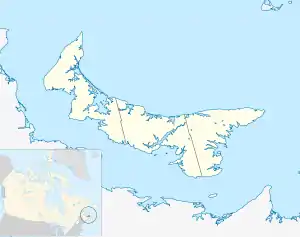Miminegash
Miminegash is a rural municipality in Prince Edward Island, Canada.[1] It is located 8 miles (13 km) northwest of Alberton and 11 miles (18 km) southwest of Tignish. It is part of a small area in Lot 3 known as either the St. Louis, Palmer Road, or Miminegash area. This area is often associated with Tignish due to the shared Acadian roots between these areas.
Miminegash | |
|---|---|
 Miminegash in Prince Edward Island | |
| Coordinates: 46.880°N 64.229°W | |
| Country | Canada |
| Province | Prince Edward Island |
| County | Prince County |
| Government | |
| • Chairperson | Audrey Callaghan |
| Time zone | AST |
| • Summer (DST) | ADT |
| Area code | 902 |
Demographics
In the 2021 Census of Population conducted by Statistics Canada, Miminegash had a population of 148 living in 66 of its 74 total private dwellings, a change of 0% from its 2016 population of 148. With a land area of 1.88 km2 (0.73 sq mi), it had a population density of 78.7/km2 (203.9/sq mi) in 2021.[12]
Community
Miminegash is within 5 miles (8.0 km) of the following communities, known collectively as the St. Louis–Miminegash area. The area was a major source and processing center for Irish Moss harvested locally from the sea. Once processed into carrageenan, it is used as an emulsifier or a source of gloss for things such as ice cream, chocolate milk or lipstick.
- St. Louis
- Palmer Road
- Pleasant View
- Roseville
- St. Lawrence
- Waterford
- Skinner's Pond
- Palmer Road north
- DeBlois
- St. Edward
References
- "Municipal Councils and Contact Information" (PDF). Government of Prince Edward Island. January 27, 2017. Retrieved February 4, 2017.
- "Table 2: Population of Census Subdivisions, 1921–1971". 1971 Census of Canada (PDF). Population. Vol. Census Subdivisions (Historical). Ottawa: Statistics Canada. July 1973. Retrieved February 2, 2022.
- "1976 Census of Canada: Population - Geographic Distributions" (PDF). Statistics Canada. June 1977. Retrieved February 2, 2022.
- "1981 Census of Canada: Census subdivisions in decreasing population order" (PDF). Statistics Canada. May 1992. Retrieved February 2, 2021.
- "1986 Census: Population - Census Divisions and Census Subdivisions" (PDF). Statistics Canada. September 1987. Retrieved February 2, 2022.
- "91 Census: Census Divisions and Census Subdivisions - Population and Dwelling Counts" (PDF). Statistics Canada. April 1992. Retrieved February 2, 2022.
- "96 Census: A National Overview - Population and Dwelling Counts" (PDF). Statistics Canada. April 1997. Retrieved February 2, 2022.
- "Population and Dwelling Counts, for Canada, Provinces and Territories, and Census Subdivisions (Municipalities), 2001 and 1996 Censuses - 100% Data (Prince Edward Island)". Statistics Canada. August 15, 2012. Retrieved February 2, 2022.
- "Population and dwelling counts, for Canada, provinces and territories, and census subdivisions (municipalities), 2006 and 2001 censuses - 100% data (Prince Edward Island)". Statistics Canada. August 20, 2021. Retrieved February 2, 2022.
- "Population and dwelling counts, for Canada, provinces and territories, and census subdivisions (municipalities), 2011 and 2006 censuses (Prince Edward Island)". Statistics Canada. July 25, 2021. Retrieved February 2, 2022.
- "Population and dwelling counts, for Canada, provinces and territories, and census subdivisions (municipalities), 2016 and 2011 censuses – 100% data (Prince Edward Island)". Statistics Canada. February 8, 2017. Retrieved February 2, 2022.
- "Population and dwelling counts: Canada, provinces and territories, and census subdivisions (municipalities), Prince Edward Island". Statistics Canada. February 9, 2022. Retrieved March 3, 2022.